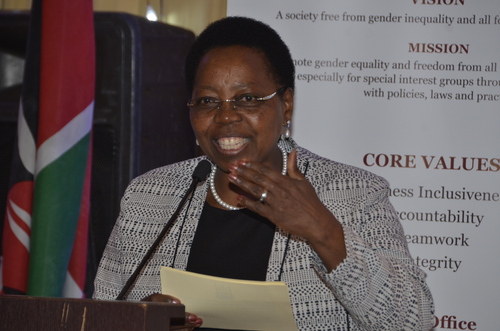STATEMENT ON THE OBSERVANCE AND CELEBRATION OF THE INTERNATIONAL DAY OF RURAL WOMEN
The National Gender and Equality Commission (NGEC) joins all rural women in Kenya and the rest of the World in commemorating and celebrating the 2020 International Day of Rural Women (IDRW). This day was established by the United Nations General Assembly in 2007, to recognize the ‘critical role and contribution of rural women, including indigenous women, in enhancing agricultural and rural development, improving food security and eradicating rural poverty’. The theme for this year’s celebration is ‘Building rural women’s resilience in the wake of COVID-19’. During this celebration, all UN Member States shall be creating awareness on the struggles faced by rural women, their needs and the key roles they play in the development agenda.
The COVID -19 pandemic has had major impacts in the lives of women, especially those living in unplanned settlements, rural areas, and hard-to-reach parts of the world. Evidence shows that during emergencies women disproportionately bear the resulting social and economic shocks. In Kenya, of the 32.7 million people living in rural areas, 16.7 million are women, a majority of whom depend on small scale agriculture and informal sector for their livelihoods (KNBS, 2019). Gender roles and responsibilities assigned to women during times of emergencies including taking care of the sick, children and the older members of society, rural women have endured the greatest brunt of the COVID-19 pandemic.
Restriction measures put by the Government to control and slow the spread of COVID-19 disrupted agricultural value chains and food systems, led to the loss of employment and small scale businesses particularly in the tourism sector, an increased burden of care and contributions to unpaid labour. Further, the COVID-19 pandemic contributed to mental stress, tensions and anxieties particularly among families that lost their members to the disease or those who suffered the infection and had to be hospitalized or confined in quarantine centres. Data from the Ministry of Health, over the last seven months, since Kenya recorded the first COVID-19 case, shows an increase in Gender-Based Violence and child pregnancies.
Despite the glaring gender differential effects and impacts of COVID-19, rural women have played a significant role in development at the grassroots levels. Despite the hard economic times, rural women have continued to cultivate, produce and process foods for their families and trade. Rural women and girls with the support of men and boys have supported the institutionalization of health protocols at the household level for preventing the spread of COVID-19 including handwashing and proper waste management in accordance with the approved Ministry of Health guidelines for taking care of persons who may have contracted the virus, and general care and protection of children, just to mention a few. While Kenya rural Counties have over time recorded low cases of COVID-19, the role of women in these efforts cannot be understated.
The Commission takes recognition of various laws, policies and programs that aim at empowering rural women. The Constitution of Kenya, 2010 Article 27 (3) guarantees equality and freedom from discrimination and advocates for equal treatment of women and men, including the right to equal opportunities in political, economic, cultural and social spheres. Some of the legal frameworks that directly promote, enforce and monitor equality and non-discrimination of women include: The Matrimonial Properties Act 2013, The Land Act 2016, Prevention of Domestic Violence Act, 2015, and the National Gender and Equality Commission Act, 2011.
Besides the legal frameworks, Kenya has various policies that promote the wellbeing of rural women. These include: The Kenya Health Policy 2014-2030, the National Policy on Gender and Development, 2019, and the National Policy on Prevention and Response to Gender-Based Violence 2014. County Governments have also invested in policy frameworks designed to harness and promote greater contributions of rural women in different aspects of development including, in the management of natural resources, building climate resilience, fiscal and credit growth, waste management, ownership of assets, among others.
The Government has also established affirmative action programs targeting women. These programs include affirmative action on funding such as Women Enterprise Fund (WEF) and affirmative actions in Accessing Government Procurement Opportunities (AGPO). More specifically, the Commission takes note of the stimulus package included in the 2020/2021 country budget that have a direct effect on the lives of rural women during times of COVID-19.
The Commission lauds the Government for the on-going development of a robust National COVID-19 Economic Recovery Strategy that seeks to among others address existing inequalities, enhance social cohesion, building community resilience and strengthen social protection. Similar efforts have also commenced at the County Government level. Women and particularly the rural women play a critical role in the response and recovery process and therefore response and recovery measures should be gender-responsive, specific and sensitive to needs and contributions of women and girls. We therefore, request the Government to continue equipping rural women with adequate tools, information and incentives to prepare for and mitigate the negative impacts of the COVID-19 pandemic.
The Commission requests all stakeholders to work together to address the multiple challenges faced by rural women during and after the COVID-19 pandemic. We request the Government to consider disproportionately expanding the social protection programme to rural households to cover a higher number of female-headed households, households with children or family members with severe disabilities and rural women suffering from acute hunger and food insecurities.
On our part, the Commission will continue to play its role in ensuring that the principles of equality and inclusion are embraced in all policy, legal and programmatic interventions developed to empower and promote the rights of rural women. The Commission will also coordinate State and Non-State Actors in providing public education to rural women on the response and recovery strategies formulated to tame socio-economic impacts of COVID-19 pandemic.
Dr. Joyce M. Mutinda (PhD.)
CHAIRPERSON


Comments